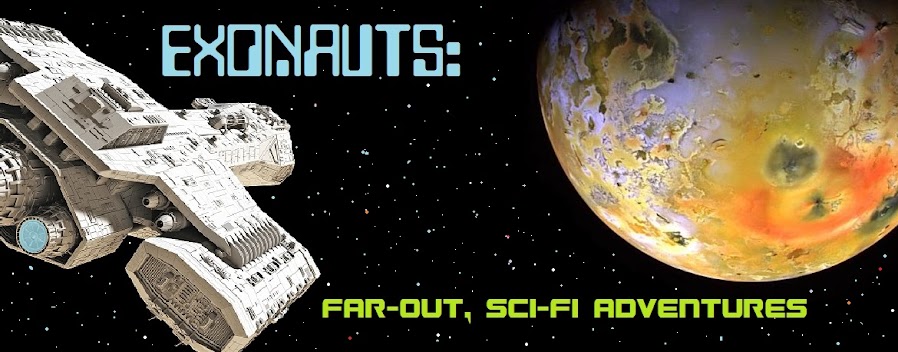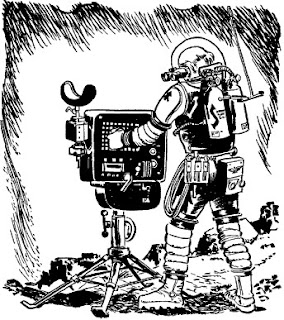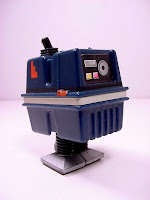Image: Spaceship Mechanic by the incomparable Jon Hrubesch!
I’m working on a few other classes for X-plorers in addition to Space Pioneer and I’ve hit a snag.
I realized that for this particular techie class I’m working on, I need to include skills that aren’t already a part of the core rules. Now that’s not in and of itself a huge deal—I can make up a few skills. But then, X-plorers is really a “what if” experiment that hypothesizes what RPGs would have been like had Dave and Gary created a sci-fi game, rather than a fantasy-based one. The rule book’s forward states:
By today’s standards, this game may be considered “out-dated”. It doesn’t take into account modern technology, super computers, cyber-punk or the advances in modern cinema and special effects. It’s an attempt to envision a unique universe of science fiction through the eyes of someone living in 1974.The game's rules are appropriately consistent with this goal and offer only a few beginning skills for four main classes: Scientist, Scout, Technician, and Soldier. In true OE form, the skills are basic and intended to cover a wide range of applications.
Do rules-light systems like X-plorers or OE D&D and its retro clones sufficiently support sci-fi settings where technology is highly specialized? In a futuristic (or modern) setting, skills become crucial for defining characters, moreso than in fantasy, I think.
Take for example the Mechanic skill for Technicians in X-plorers. Its primary requisite is Intelligence and states “This is the Tech’s chance to repair, undertand, and operate any type of mechanical device.”
The rules don’t say the Mechanic skill needs to be further specialized. Should they be?
Possibly.
West End Games 2nd edition of the Star Wars RPG had a wide array of skills under different ability scores—including at least a dozen for different types of repair (computer, ground vehicle, star fighter, walker, etc.). This makes a lot of sense because one might assume that someone who can repair something like a hover car/skimmer (the equivalent of an automobile) shouldn’t really be able to apply the same skill to a Star Destroyer’s hyperdrive (a naval battleship).
So when I come back to the X-plorers forward--which acknowledges a certain outdated-ness--I have to wonder if this is an inherent flaw. The rules should probably take in to account that even in the 70s, a master auto mechanic working on the latest model sports car still wouldn't be able to repair a satellite launched by NASA around the same time.
Better questions might be: how many and what type of skills are needed to give a sci-fi RPG “good enough” footing so players can customize without violating the rules-light principle sought in the game’s mission statement?
If a fix is needed, what’s the answer?
- Add specialized skills to the existing ones balanced with an extra XP cost? (i.e., mechanics would spend more XP to learn how to fix something complicated like a star cruiser jump drive.
- Or maybe specialized skills should be limited to higher levels—imitating life in a sense that you spend time mastering the basics before you graduate to bigger/tougher challenges in your training.
I’m almost wondering if I should convert what I’ve made over to a different system (SW WEG, Star Frontiers, Traveller, etc.). I guess I want to avoid having to write up new skills every time I create a new class.
Am I over thinking this? Is there a simple/elegant solution? Please share your thoughts!



















